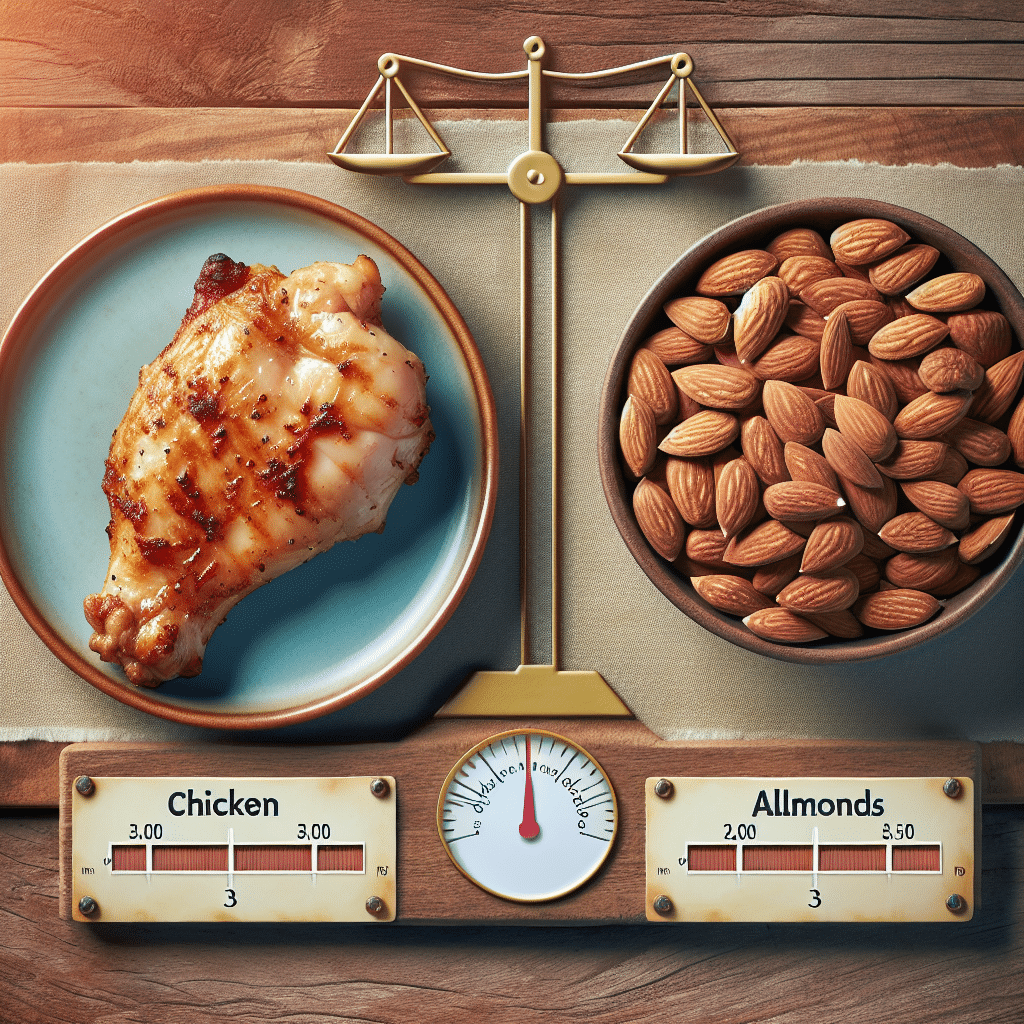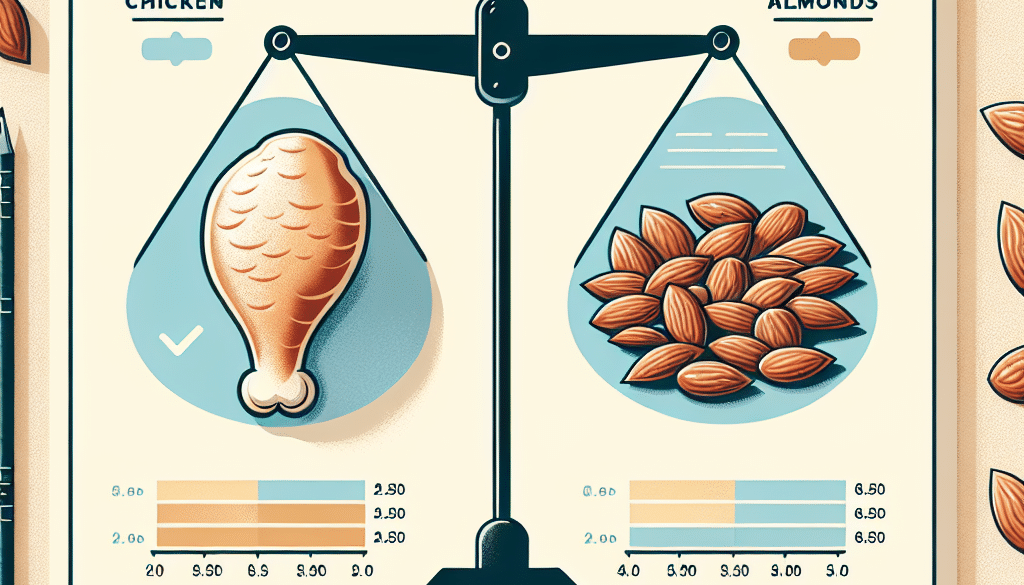Which Has More Protein Chicken Or Almonds?
-
Table of Contents
- Chicken vs. Almonds: Which Packs More Protein Punch?
- Understanding Protein and Its Importance
- Protein Content in Chicken
- Protein Content in Almonds
- Comparing Chicken and Almonds
- Nutritional Profiles: Beyond Protein
- Considerations for Dietary Choices
- Conclusion: Balancing Protein Sources
- Explore ETprotein’s High-Quality Protein Products
Chicken vs. Almonds: Which Packs More Protein Punch?

When it comes to protein sources, the debate often arises between animal-based and plant-based options. Two popular choices that frequently come up are chicken and almonds. Both are known for their health benefits and protein content, but which one truly offers more protein? In this article, we’ll delve into the nutritional profiles of chicken and almonds, compare their protein content, and discuss the advantages and disadvantages of each.
Understanding Protein and Its Importance
Protein is a macronutrient essential for building and repairing tissues, making enzymes and hormones, and supporting immune function. It’s made up of amino acids, some of which are essential because our bodies cannot produce them and must obtain them from food. Both animal and plant sources can provide these essential amino acids, but their protein quality and content can vary significantly.
Protein Content in Chicken
Chicken is one of the most popular sources of animal protein. It’s lean, versatile, and widely available. The protein content in chicken can vary depending on the cut and how it’s cooked. On average, a 3-ounce (85 grams) serving of cooked chicken breast contains about 26 grams of protein. Chicken is also a complete protein, meaning it contains all nine essential amino acids required by the human body.
Protein Content in Almonds
Almonds are a powerhouse of nutrients and a popular snack among health-conscious individuals. They are a plant-based protein source and also provide healthy fats, fiber, vitamins, and minerals. A 1-ounce (28 grams) serving of almonds, roughly a handful or about 23 almonds, contains about 6 grams of protein. While almonds do contain protein, they are not considered a complete protein because they lack sufficient amounts of certain essential amino acids.
Comparing Chicken and Almonds
When directly comparing the protein content of chicken and almonds, chicken comes out on top. To match the protein content of a 3-ounce serving of chicken breast, you would need to consume approximately 4.3 ounces (122 grams) of almonds, which is more than four times the standard serving size. However, it’s important to consider more than just the protein content when choosing between these two foods.
Nutritional Profiles: Beyond Protein
While chicken boasts a higher protein content, almonds offer other nutritional benefits. They are rich in heart-healthy monounsaturated fats, antioxidants like vitamin E, and minerals such as magnesium and potassium. Almonds also provide dietary fiber, which is absent in chicken and essential for digestive health.
Chicken, on the other hand, is lower in calories and fat compared to almonds and provides important vitamins and minerals such as B vitamins, especially niacin and B6, phosphorus, and selenium. It’s also easier to consume larger quantities of chicken without significantly increasing calorie intake, which can be beneficial for those looking to build muscle mass or maintain a high-protein diet.
Considerations for Dietary Choices
Choosing between chicken and almonds may depend on dietary preferences and restrictions. For those following a vegetarian or vegan diet, almonds and other plant-based proteins are essential. However, individuals with nut allergies must avoid almonds and can rely on chicken as a safe protein source.
Environmental impact is another consideration. Generally, plant-based proteins like almonds have a lower environmental footprint compared to animal proteins. However, water usage for almond cultivation is a concern, especially in drought-prone regions.
Conclusion: Balancing Protein Sources
In conclusion, while chicken provides more protein per serving than almonds, both are valuable components of a balanced diet. Chicken is an excellent choice for those seeking a high-protein, low-fat option, while almonds offer additional nutrients and health benefits that complement a well-rounded nutritional plan. It’s important to consider personal health goals, dietary needs, and environmental factors when choosing between these two protein sources.
For those looking to diversify their protein intake, ETprotein offers a range of high-quality organic bulk vegan proteins that can serve as excellent alternatives or complements to traditional protein sources like chicken and almonds.
Explore ETprotein’s High-Quality Protein Products
ETprotein is a reputable manufacturer and supplier of organic bulk vegan proteins and L-(+)-Ergothioneine (EGT). Their product range includes organic rice protein, pea protein, and various seed proteins, all characterized by a neutral taste, non-GMO, and allergen-free attributes. With purity levels exceeding 98%, ETprotein caters to industries such as nutraceuticals, pharmaceuticals, cosmeceuticals, and food and beverage. Whether you’re a distributor, trader, or manufacturer, ETprotein can meet your protein needs with their extensive product range.
About ETprotein:
ETprotein, a reputable protein and L-(+)-Ergothioneine (EGT) Chinese factory manufacturer and supplier, is renowned for producing, stocking, exporting, and delivering the highest quality organic bulk vegan proteins and L-(+)-Ergothioneine. They include Organic rice protein, clear rice protein, pea protein, clear pea protein, watermelon seed protein, pumpkin seed protein, sunflower seed protein, mung bean protein, peanut protein, and L-(+)-Ergothioneine EGT Pharmaceutical grade, L-(+)-Ergothioneine EGT food grade, L-(+)-Ergothioneine EGT cosmetic grade, L-(+)-Ergothioneine EGT reference grade and L-(+)-Ergothioneine EGT standard. Their offerings, characterized by a neutral taste, non-GMO, allergen-free attributes, with L-(+)-Ergothioneine purity over 98%, 99%, cater to a diverse range of industries. They serve nutraceutical, pharmaceutical, cosmeceutical, veterinary, as well as food and beverage finished product distributors, traders, and manufacturers across Europe, USA, Canada, Australia, Thailand, Japan, Korea, Brazil, and Chile, among others.
ETprotein specialization includes exporting and delivering tailor-made protein powder and finished nutritional supplements. Their extensive product range covers sectors like Food and Beverage, Sports Nutrition, Weight Management, Dietary Supplements, Health and Wellness Products, and Infant Formula, ensuring comprehensive solutions to meet all your protein needs.
As a trusted company by leading global food and beverage brands and Fortune 500 companies, ETprotein reinforces China’s reputation in the global arena. For more information or to sample their products, please contact them and email sales(at)ETprotein.com today.












